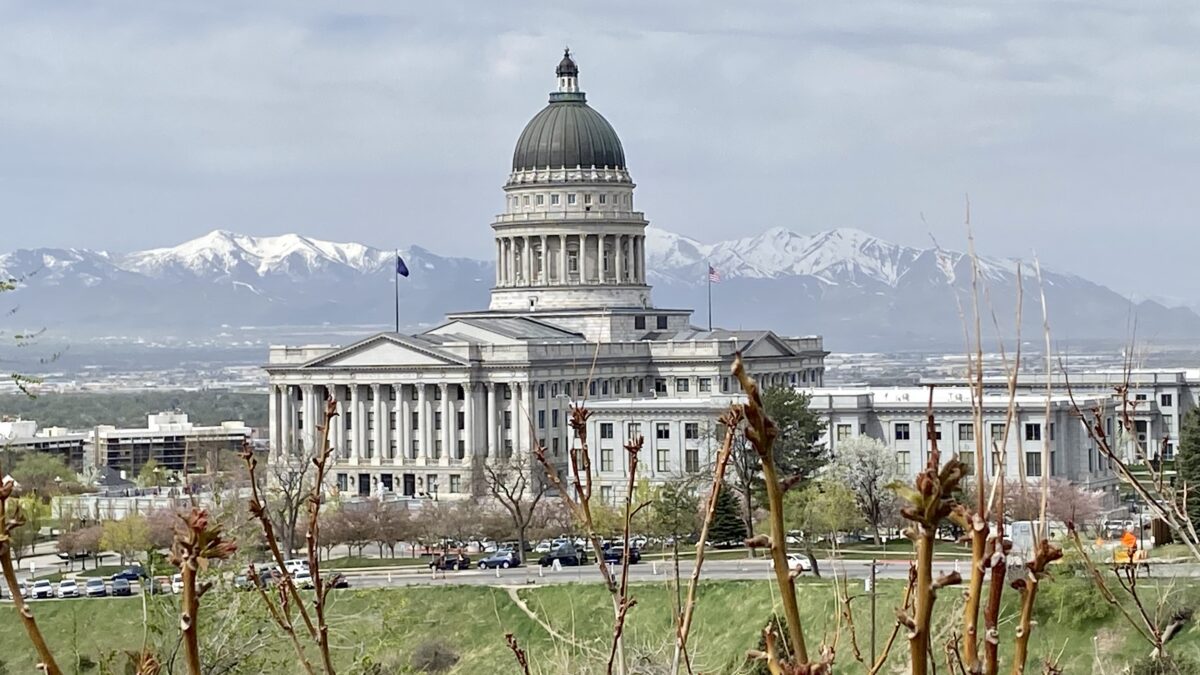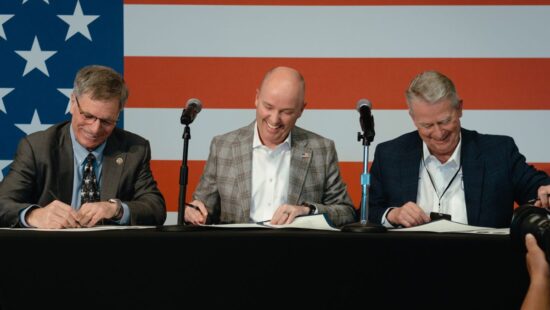Politics
Candidates debate energy costs, polarization, affordable housing at Utah Gubernatorial debate

Utah State Capital. Photo: Michele Roepke // TownLift
SALT LAKE CITY – In a lively debate featuring incumbent Governor Spencer Cox, Democratic nominee Brian King, and Libertarian candidate Rob Latham, candidates discussed their visions for Utah’s future and how they plan to address pressing issues facing the state of Utah.
To begin the debate, the gubernatorial candidates were each asked a question on the perceived increase of political polarization throughout the country, and how elected leaders can foster constructive dialogue.
Libertarian candidate Rob Latham expressed concern about the state’s two-party system and its role in creating polarization, while also advocating for proportional representation and ranked-choice voting to broaden political participation and reduce divisiveness.
“I’m a champion of proportional representation of proportional ranked choice voting. These are electoral methods used in most of the world’s democracies that are depolarizing and allow a broader spectrum of Utahns, of Americans, to participate in our political process,” Latham said.
When asked about polarization, Cox recalled the unity felt after September 11, stating that true unity involves acting together despite differences. “Unity is not believing the same thing. Unity is acting together,” he said, emphasizing his efforts to engage with leaders from both parties and promote respectful dialogue.
King, however, took issue with Cox’s endorsement of former President Donald Trump, suggesting it contradicts the governor’s calls for unity. “The governor’s words about disagreeing better ring hollow,” King said, criticizing Cox for supporting a figure he views as a poor example of leadership.
Regarding economic strategies and the rising costs of essential products, Governor Spencer Cox highlighted his administration’s achievements, including the largest tax cut and teacher raises in Utah’s history.
“Over the past four years, we’ve accomplished so much together,” Cox said, emphasizing ongoing economic growth and plans to build 35,000 starter homes to address housing costs and double the state’s energy production to lower utility expenses.
Governor Cox also pointed to the federal government for rising inflation, claiming the current Presidential administration “that is spending money out of control, the same type of spending that my Democratic colleagues here are supportive of.”
In contrast, Brian King criticized the current administration’s focus on macroeconomic metrics, arguing that many Utahns still struggle financially despite the state’s growth. “If we’re the best economy in the country, why do I find such a hard time making ends meet?” King questioned.
King pledged to prioritize support for struggling middle-class families from day one of his administration.
Rob Latham criticized Governor Cox’s current handling of the state’s economy, citing a bill recently passed which will provide a subsidy for first time homebuyers, claiming that the legislation has caused home prices to increase by 20%.
Latham attributed Cox’s handling of the economy to “crony developer capitalism.”
Candidates then were questioned on their visions for addressing energy production and transportation infrastructure, two critical issues for the state’s future.
King emphasized the need to embrace renewable energy sources. “Renewable energy is not the future, it’s the present knocking on our door saying, ‘Why are you late?’” King said.
King then criticized current policies for not fully leveraging Utah’s potential in solar, wind, and hydro power, advocating for a shift towards more sustainable practices that align with free market principles.
Latham supported an “all of the above” energy approach, which would include the implementation of nuclear power.
He also expressed concern about Utah’s history with polluting energy sources, stating, “We want to make sure that when we authorize energy producers, they don’t spoil our environment.” Latham suggested that advanced nuclear technologies, such as thorium reactors, could be a safe and clean addition to the state’s energy mix.
Incumbent Governor Spencer Cox defended his administration’s track record on energy, emphasizing an already in use “all of the above” strategy.
“We are growing our renewables faster than many states,” Cox said, attributing slow progress to federal permitting issues.
He also then criticized King’s stance, arguing that blocking energy production before a proper transition could lead to higher energy costs. “We are going to double energy production in Utah over the next 10 years,” Cox pledged.
The discussion then pivoted to addressing the critical issue of housing affordability in Utah, a growing concern for many residents.
Cox highlighted the urgent need for more affordable housing. “Over the past 15 years, we’ve stopped building starter homes—homes under $400,000,” he said. Governor Cox highlighted his plan to construct 35,000 starter homes over the next five years, emphasizing the necessity of ensuring that future generations can afford homes.
King spoke on the rising home costs and the need for more affordable starter homes, while also proposing to disincentivize people buying vacation homes in the state.
“One of the things we can do is provide greater disincentives for people who do not live in Utah to not purchase homes as speculative or investment properties. They have no intention of living there. Many times they just want to either flip them for speculation purposes, or they want to rent them out at inflated rents, and that’s not good for Utahns. We need to make sure that Utah housing stock is purchased and available for Utahns,” King said.
Rob Latham criticized the influence of developers in the Utah legislature, suggesting that their interests may not align with increasing housing affordability.
“One way developers make their money is to reduce the supply,” Latham argued. He advocated for market-oriented solutions and pointed to the Free to Build initiative as a potential path to increase housing affordability. Latham promised to challenge any attempts by developers to manipulate housing markets for profit.
The debate also addressed Constitutional Amendment D, which concerns the legislature’s power to repeal or modify citizen ballot initiatives.
Brian King strongly opposed Amendment D, describing it as a power grab by the legislature. “It’s nothing but a power grab,” King said, criticizing the amendment as deceitful and an attempt to undermine the initiative process. He urged voters to reject the amendment, arguing that it would weaken the power of citizens in shaping state laws.
Rob Latham agreed with King, denouncing the amendment as a deceptive measure. He referred to past instances where initiatives were undermined by legislative actions and criticized the amendment for targeting government reforms. “It’s offensive because it only applies to altering and reforming government,” Latham stated.
Governor Cox acknowledged the concerns but defended the need for a balanced approach to direct democracy. “Initiatives should be rare, but they are important,” Cox said.
He noted that while the best states have fewer initiatives, maintaining the power to propose and overturn laws is crucial. Cox also mentioned that while he supports the amendment, the governor does not have a role in constitutional amendments.
In response, King accused Cox of complicity with the legislature, pointing out that the governor supported legislative actions that enabled the amendment to reach the ballot. “The governor signed two bills that facilitated this amendment,” Latham claimed, suggesting that Cox’s support for the amendment reflects a broader alignment with legislative power grabs.
All three candidates will appear on the official ballot in the general election held on November 5.



















